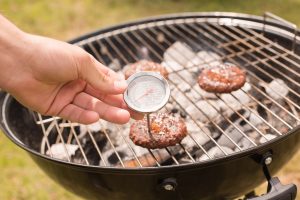Each year, the Centers for Disease Control estimates that one out of six Americans gets sick by consuming contaminated foods or beverages. In Virginia, the most frequently reported gastrointestinal diseases include bacterial infections such as salmonellosis and campylobacteriosis, and giardiasis, a parasitic disease. In addition, norovirus is one of the most frequently reported causes of gastrointestinal outbreaks. Typical symptoms of foodborne illness are vomiting, diarrhea, and flu-like symptoms, which can start anywhere from hours to days after contaminated food or drinks are consumed.
The proper handling and preparation of food is important in preventing foodborne illnesses. Most foodborne illnesses result from food being contaminated when it is being prepared or served.
When preparing meals remember to follow these safety tips:
- Clean – Wash hands, cutting boards, utensils, and
 countertops.
countertops. - Separate – Keep raw meat, poultry, and seafood separate from ready-to-eat foods.
- Cook – Use a food thermometer to ensure that foods are cooked to a safe internal temperature: 145°F for whole meats (allowing the meat to rest for 3 minutes before carving or consuming), 160°F for ground meats, and 165°F for all poultry.
- Chill – Keep your refrigerator below 40°F, and refrigerate food that will spoil.
- When transporting food, it is important to remember that harmful bacteria can start to grow when prepared food falls between temperatures of 40 and 140 °F (4.4 °C and 60 °C); perishable food transported without an ice or heat source won’t stay safe long. It is important to properly store and refrigerate leftovers.
Keep in mind the following when storing and eating leftovers:
- Refrigerate cooked leftovers within 2 hours and ensure the temperature in the refrigerator is at 40 °F or below.
- Divide leftovers into smaller portions and store in shallow containers in the refrigerator.
- Leftovers should be eaten, frozen or discarded within 3 to 4 days
- Wash hands with warm water and soap for 20 seconds before and after handling food.
- Reheat cooked leftovers to 165 °F as measured with a food thermometer. Sauces, soups and gravies should be reheated by bringing them to a boil.
- When microwaving leftovers, make sure there are no cold spots in food (where bacteria can survive).
Grill Safety
The onset of warm weather often prompts many people to begin using their outdoor grills to prepare foods. The following tips can help reduce the risk for injuries and help prevent fires:
- Always supervise a barbecue grill when in use.
- Position the grill well away from siding, deck railings and out from under eaves and overhanging branches.
- Keep children and pets far away from grills: declare a three-foot “safe zone” around the grill.
- With charcoal grills, only use charcoal starter fluids designed for barbecue grills and do not add fluid after coals have been lit.
- With gas grills, be sure that the hose connection is tight and check hoses carefully for leaks. Applying soapy water to the hoses will easily and safely reveal any leaks. If you detect a leak, immediately turn off the gas and don’t light the grill.
- All propane cylinders manufactured after April 2002 must have overfill protection devices (OPD). OPDs shut off the flow off propane before capacity is reached. OPDS are easily identified by their triangle-shaped hand wheel.
- Always follow the manufacturer’s instructions and have the grill repaired by a professional, if necessary.
- Remember to keep your grill clean and remove grease or fat buildup in trays below grill so it cannot be accidentally ignited.
- Propane and charcoal BBQ grills must only be used outdoors. If used indoors, or in any enclosed spaces, such as tents, they pose both a fire hazard and the risk of exposing occupants to toxic gases and potential asphyxiation.
Read more:
